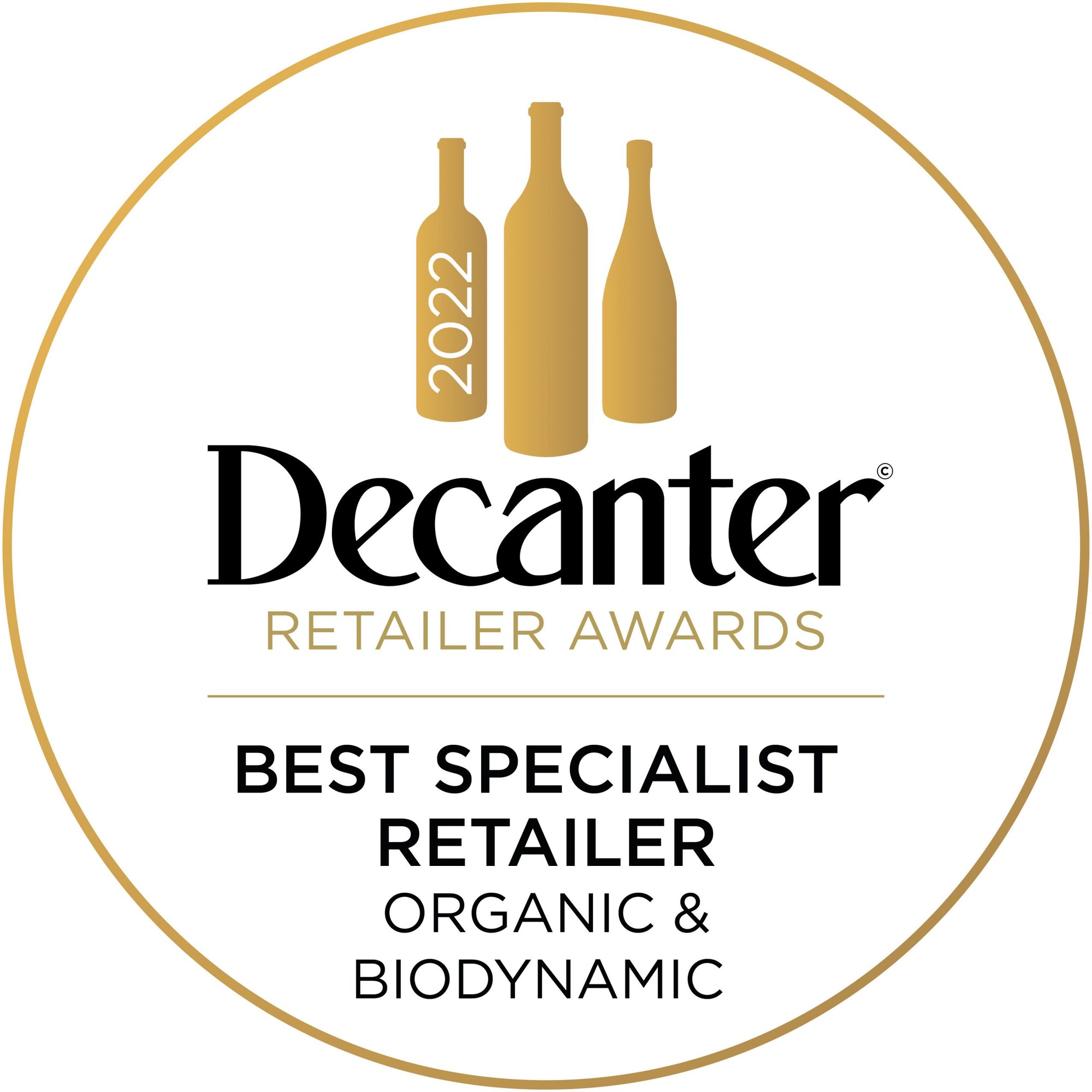This June here at The Good Wine Shop we celebrate the joys of Organic and Biodynamic wines. Something we feel very passionate about and have been recognised for by Decanter in 2022 when obtaining the award of Best Specialist Retailer for Organic & Biodynamic Wines.
While we all naturally want the immediate pleasure of a delicious wine however it might have been made, it’s also important to appreciate how these farming methods contribute to a more sustainable and healthier environment in the longer term. So just what should you expect from a wine that bears organic certification?

Fundamentally Organics deals with what goes on beneath the soil and in the canopy of the vine rather than the actual winemaking. The vineyards from which the wine has been made must be cultivated in compliance with organic rules – meaning no chemical herbicides, pesticides, fungicides or fertilizers have been used on the land and vines.
Copper Sulphate (CuSo4) also known as “Bordeaux mixture” is permitted and widely used against rot – it is an organic compound. If this sounds obvious it’s worth remembering that up until around 40 years ago most vineyards in Europe were totally dependent on a programme of agrichemical treatments for rot, mildews and every other conceivable problem. These products were applied routinely, on appointed days, whether or not there was a problem that actually needed to be dealt with. If you had shares in Agrichemicals you stood to do very well indeed.
The result of years of this chemical dependency was soil with no microbial life whatsoever –bereft of any nourishment. But, as a younger and better travelled generation of winemakers returned to their family estates in Burgundy in the 1980s, they were appalled at the state of the soils and immediately started the conversion to organic viticulture. They understood that the best fruit comes from healthy, strong vines whose roots penetrate the soil more deeply and nourish the plant. Burgundy ‘s climate is much drier making it easier to farm organically - there’s generally less risk of rot and mildew. It’s also a prestigious region where high prices mean the additional costs of working organically can be recovered.

As far as the actual process of winemaking is concerned the only difference between organic and non-organic wine is that the former must have 25% less sulphur. As a winemaker you are still free to use as many “tweakments” such as acidifying, adding a commercial yeast or fining and filtering aggressively, as you see fit . If you are for example, making a large quantity of organic wine for a supermarket that will probably be bulk-shipped and bottled in the UK, it will have to be more heavily processed to be stable -yet can still be labelled organic.
So how do Biodynamic wines differ from the merely organic?
Biodynamics is a systemic approach based on Rudolf Steiner (he of the Steiner School model which aims to educate the whole person not just a rigid academic approach) and his spiritual and organic agricultural teaching. Bio -life = dynamic -energy follows practical steps in the farm or vineyard to build soil fertility and health. Biodynamic sprays stimulate biological activity in the soil improving the retention or water and nutrients. Organic waste is recycled with large scale composting. Smaller, lighter tractors or horses are used to work the soil to avoid compaction. That in turn allows the vine’s roots to spread deeper -that helps the vines through periods of drought.
The lunar calendar is followed with specific activities carried out in line with whether the moon is waning or waxing and according to whether it is a root, leaf, fruit or flower day in the Biodynamic calendar. Bottling may well be done on a Flower Day when the fruit and aromas are at their best and when the moon’s gravitational pull is least .
Because viticulture is a monoculture it’s more susceptible to disease so the vines are strengthened by tisanes and homeopathic remedies dynamized by mixing with water and applied to the vines at specific times. But it’s also in the winery that Biodynamics makes a big difference.....

Grapes will only be hand-picked and the juice moved around by gravity not pumps in the cellar.
No additions to the fermenting must are permitted -no yeast, no sugar, no acid, no enzymes or tannins nor any process which is seen as altering the essential structure of the wine such as fining. Anything other than a very coarse filtration is not allowed.
Such a hands-off approach in the cellar demands very hands on vigilance. It’s most definitely not a charter to let nature take any course – a faulty wine is a faulty wine whether it be organic, biodynamic or not. Sulphur is generally used only on bottling and at the minimum level necessary to prevent spoilage .
If this all sounds a bit woo hooey – and to many it does- I’d make a comparison with great poetry - it requires a willing suspension of disbelief. Good biodynamic wines have a certain equilibrium, intensity and purity of flavour and texture that is captivating. A great poem is always much more than the sum of its technical parts - however much the nerdy bit of your brain might relish unpicking the technical brio. Depending on where you are in the world your Biodynamic credentials will be certified by Demeter or Biodyvin. Certification is not cheap and once lost will require more years of waiting to re -acquire -at more cost. For this reason, many of the producers whose wines we sell practice organic and some aspects of biodynamics too, but don’t seek certification precisely because there may be a time when they have to intervene with a chemical treatment or risk losing their entire crop. Few can afford that choice.
All of these approaches prioritise soil health and reduce chemical use and that’s an investment for everyone’s future.




